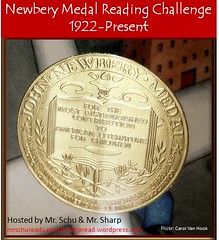skip to main |
skip to sidebar
Whenever I tell people of my adventure into Reader's Workshop, I often feel like I am defending my choices rather than just sharing teaching strategies and techniques. The most common question (and usually one of the first three) that makes me feel like I am justifying my methods is: "But, what do you GRADE?" Never mind how much my students are growing and learning as readers and writers...
It makes me sad that education has been reduced to the first five letters of the alphabet (six if your district gives out "Fs"). I am more concerned about giving my kids meaningful feedback, rather than assigning their work points based on my own opinion. I recently started having my students grade some of their own writing, specifically their writing journals. After I gave them the power, I began noticing improvements. Students weren't comfortable giving themselves full credit when they knew they hadn't put in the effort to edit and "flex their writing muscles." I love this new method so much, that I am going to use it more often for class work, specifically with assignments that are of a subjective nature (writing pieces, response journal entries, written responses to reading, etc.). This way, we can have a discussion about their work, with them putting forth enough effort to prove they deserve they grade they have given themselves. I may be so bold as to have students create a portfolio of their best work and come up with their quarterly grades, as suggested by Joe Bower on his blog (click here for a list of his blog posts related to abolishing grades.).
The only question is: will this be supported or seen and too radical? I am not a parent, so I can't speak for those who have children. However, logic tells me that most parents would rather a teacher spend his or her time guiding students, planning quality lessons, and providing feedback kids can use to actually improve upon their learning (a percentage and a smiley face do not good feedback make). But when I spend hours per evening as an intermediate reading and writing teacher grading close to 50 written responses multiple times a week, it's hard to do all three of those things and feel like I am doing them all well. If more teachers opposed the idea of grades and embraced the idea of feedback, would that help bring about the change we are anxiously awaiting for in education? What do you think?

 This week I had the great fortune (I can say that now that it's done) to host a "fishbowl" observation for two days in my reading and writing classroom. Several teachers from another school in the county were interested in seeing how I implement Reader's Workshop in a county that has been using the same anthology for over a decade (that's a whole other blog post). Although I was hesitant (who likes being watched all day for two days straight?), I obliged for the good of the children. I figured, the more educators who embrace this individualized style of teaching, the better!
This week I had the great fortune (I can say that now that it's done) to host a "fishbowl" observation for two days in my reading and writing classroom. Several teachers from another school in the county were interested in seeing how I implement Reader's Workshop in a county that has been using the same anthology for over a decade (that's a whole other blog post). Although I was hesitant (who likes being watched all day for two days straight?), I obliged for the good of the children. I figured, the more educators who embrace this individualized style of teaching, the better!
It all started when a handful of teachers from my school, along with myself, went to their school to see Debbie Miller teach a model reading lesson (side note: I was in teacher heaven). During our debriefing session with Debbie, we discussed why she did what she did and where she would go next. Many of the teachers seemed to have a hard time understanding how they could apply this very foreign teaching style and still meet the requirements set forth by our district. When one of my colleagues chimed in that I was already implementing reading workshop, the questions began to be directed at me. "So, your kids are all reading different books?" and "How do you know they understand what they are reading?" were just a couple of inquiries. And thus, the idea to come to our school and see it all in the flesh was born.
I am by no means an expert. I am continually refining my strategies in reading workshop to align with my personal teaching beliefs. My students are used to this, and they know that at any given moment, Mrs. P. could (and probably will) change her mind if something "just isn't working." I am so thankful to have the flexibility to do this, and that privilege comes from having a supportive administration that allows me to do what I know is best for my students. And this is exactly what I told my visitors. Reading workshop is a work in progress, but I was happy to model and answer questions because I wish I had had someone in either my building or my district to go to when I began Reader's Workshop this year.
I began by pointing my visitors in the direction of great resources to begin gathering ideas and information (I don't know if I could have done it without the inspiration of Donalyn Miller, Debbie Miller, Fountas and Pinnell, "The Two Sisters," and Franki Sibberson). I told them about Twitter and blogging. We chatted about the power of quality graphic novels (I got some sideways looks on that one at first) and staying current with the latest and greatest in children's literature. I showed them how I record my observations and assess my students daily. We talked about what gets graded, what doesn't, and why. I explained how we practice skills repeatedly before I assess whether or not they have been "mastered," and even when they have they are revisited constantly. I showed them my binder that I would be lost without, my students' notebooks, and that you really can teach a lot in 15 minutes. The listened in on our read aloud, one-on-one conferences, guided reading groups, and reteach lessons. And when they reluctantly walked up to me to ask a question (or 12), I smiled and told them I was there to help and give as much support as I could in my own rookie way.
When all was said and done, my principal and fellow coworkers told me what they had heard through the grapevine: those visiting teachers were excited about potentially starting reading workshop at their own school. As soon as I heard that, all the stress, all the anxiety of being center stage, all the questioning about why I had to put myself through it was worth it. If even one teacher in another school begins teaching Reader's Workshop, I will feel like I had a real impact. I sincerely hope that the power students making choices about what they read and how they learn spreads (and FAST) through our district. The kids need it.

Some of you may know that last year I created a project on DonorsChoose to get "nooks" (aka cushions, pillows, etc.) for my kids to use during Reading Workshop. My project was successful thanks to family, friends, and Twitter followers! Here are some pictures of my students getting lost in the world of reading:
The kids look forward to this time every day. It is the one thing I keep consistent no matter what unexpected schedule changes may arise. Thanks to my supporters I really feel like I am doing my part to create lifelong readers!
How do you encourage your students to get lost int heir reading in YOUR classrooms?



















